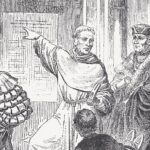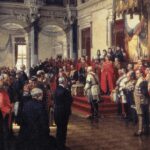October 16, 1708
Birth of the biologist Albrecht von Haller in Bern, Switzerland. He was a professor of medicine, anatomy, and surgery at the University of Göttingen. He was the first to understand the system of respiration. He demonstrated the function of nerves. His 8-volume Elementa Physiologiae Corporis Humani is a classic in medicine.
October 16, 1813
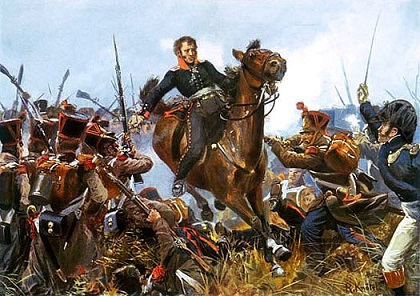 Beginning of the Battle of Leipzig (through October 19). The Battle of Leipzig was one of the decisive battles against Napoleon. Napoleon had retreated from Moscow and would be defeated at Waterloo by Wellington and Blücher.
Beginning of the Battle of Leipzig (through October 19). The Battle of Leipzig was one of the decisive battles against Napoleon. Napoleon had retreated from Moscow and would be defeated at Waterloo by Wellington and Blücher.
October 16, 1827
Birth of Arnold Böcklin in Basel, Switzerland. The painter is characterized by his metaphysical symbolism and his love of the Italian landscape.
October 16, 1854
Birth of Karl Kautsky in Prague, Austrian Empire (now in the Czech Republic). Kautsky studied at the University of Vienna and there joined the Social Democratic Party. He was a close friend of Friedrich Engels. He the primary author of the Erfurt Program which oriented the party to an evolutionary variety of Marxism.
October 16, 1927
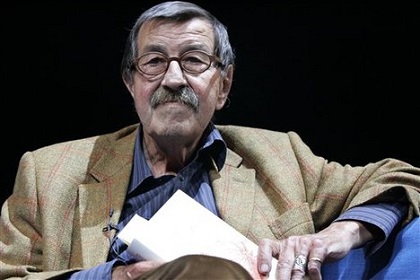 Birth of Günter Grass (1927-2015) in Danzig, Germany (now in Poland). Grass is doubtlessly the most known of Germany’s contemporary novelists. After WWII he was a member of the literary association , Gruppe 47. Die Blechtrommel appeared in 1959, Katz und Maus in 1961, Hundejahre in 1963, Örtlich betäubt in 1969, Der Butt in 1977, Unkenrufe in 1992 and Ein weites Feld in 1995. The film version of Die Blechtrommel won an Academy Award in the United States.
Birth of Günter Grass (1927-2015) in Danzig, Germany (now in Poland). Grass is doubtlessly the most known of Germany’s contemporary novelists. After WWII he was a member of the literary association , Gruppe 47. Die Blechtrommel appeared in 1959, Katz und Maus in 1961, Hundejahre in 1963, Örtlich betäubt in 1969, Der Butt in 1977, Unkenrufe in 1992 and Ein weites Feld in 1995. The film version of Die Blechtrommel won an Academy Award in the United States.
October 16, 1941
The German army reaches a position only 60 miles from Moscow.
October 16, 1946
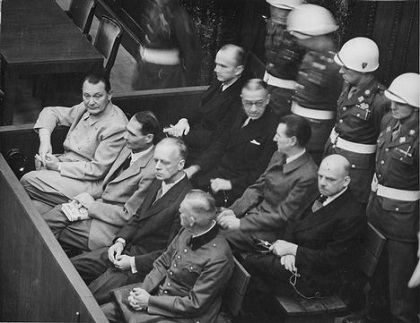 Joachim von Ribbentrop, Nazi foreign minister, is executed in Nürnberg, Germany by the War Crimes Commission. He had met Hitler and joined the Nazi Party in 1932. In 1935 he negotiated the agreement with Great Britain which allowed the building of a German navy (disallowed by the Versailles Treaty). In 1939 he negotiated the non aggression pact with the Soviet Union. He was tried by the Nürnberg court after the war, found guilty of war crimes and hanged. While in prison he wrote his memoirs, Zwischen London und Moskau.
Joachim von Ribbentrop, Nazi foreign minister, is executed in Nürnberg, Germany by the War Crimes Commission. He had met Hitler and joined the Nazi Party in 1932. In 1935 he negotiated the agreement with Great Britain which allowed the building of a German navy (disallowed by the Versailles Treaty). In 1939 he negotiated the non aggression pact with the Soviet Union. He was tried by the Nürnberg court after the war, found guilty of war crimes and hanged. While in prison he wrote his memoirs, Zwischen London und Moskau.
October 16, 1946
Wilhelm Keitel is executed for war crimes in Nürnberg, Germany. He was head of Germany’s armed forces during WWII. He was completely loyal to Hitler.
October 16, 1946
Fritz Sauckel is hanged in Nürnberg, Germany. Sauckel was the Nazis’ head of slave labor procurement during World War II. Tried in Nürnberg, he was found guilty of war crimes.
October 16, 1946
The Austrian Nazi leader Arthur Seyss-Inquart is executed in Nürnberg.
October 16, 1946
General Alfred Jodl is executed in Nürnberg.
October 16, 1946
Execution of Alfred Rosenberg in Nürnberg, Germany. Rosenberg moved to Munich, Germany in 1919 where he joined the young Nazi party. He edited the party’s paper, Völkischer Beobachter. It was he who drew from the English racist Houston Stewart Chamberlain’s views and warned of a Jewish plot to take over the world. He was designated by Hitler to lead the party while Hitler was in prison in the 20’s. Possibly his most influential book was Der Mythus des 20. Jahrhunderts in 1934 in which he developed the basis of the idea of “German racial purity”. After the war at the war crimes trials in Nürnberg Rosenberg was executed by the allies.
October 16, 1946
Julius Streicher, one of the strongest voices of anti-Semitism among the Nazis is hanged in Nürnberg after being found guilty of war crimes. Streicher who had been an elementary school teacher in Nürnberg joined the Nazi party and developed as one of those pushing strongly in anti-Semitic directions. He founded and edited the strongly anti-Semitic newspaper Der Sturmer in 1923 and through that position along with his party position was instrumental in the passage of the Nürnberg Laws in 1935.
October 16, 1946
Execution of Wilhelm Frick in Nürnberg, Germany. Frick was the minister of the interior for Adolf Hitler. He had been with Hitler in Munich and became a member of the Reichstag in 1924. He was instrumental in drafting the Nürnberg Laws of 1935. (The Nürnberg Laws removed legal protections from the Jews.) After the war he was tried in Nürnberg and executed for war crimes.
October 16, 1946
Execution of Hans Frank in Nürnberg, Germany. Frank joined the Nazi Party in 1921. In the early years he served as Hitler’s personal attorney. When the Nazis came to power he became the minister of justice. In 1939 after the conquest of Poland, Frank was appointed governor of Poland. He directly ordered the execution of hundreds of thousands in that position. He was captured in 1945, tried at Nürnberg and hanged.
October 16, 1963
Election of Ludwig Erhard as Chancellor.
October 16, 1973
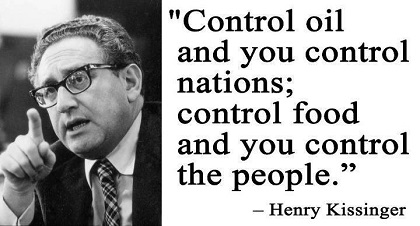 Henry Kissinger, an immigrant from Germany, wins the Nobel Peace Prize. He was jointly awarded the 1973 Nobel Peace Prize with Lê Đức Thọ for helping to establish a ceasefire and U.S. withdrawal from Vietnam. The ceasefire, however, was not durable.[30] Thọ declined to accept the award and Kissinger appeared deeply ambivalent about it (donating his prize money to charity, not attending the award ceremony and later offering to return his prize medal.
Henry Kissinger, an immigrant from Germany, wins the Nobel Peace Prize. He was jointly awarded the 1973 Nobel Peace Prize with Lê Đức Thọ for helping to establish a ceasefire and U.S. withdrawal from Vietnam. The ceasefire, however, was not durable.[30] Thọ declined to accept the award and Kissinger appeared deeply ambivalent about it (donating his prize money to charity, not attending the award ceremony and later offering to return his prize medal.
October 16, 1994
The Federal Republic of Germany holds parliamentary elections. The CDU/CSU gets 41.4% of the vote, the SPD 36.4%, the FDP 6.9%, the Green Party 7.3%. The CDU/CSU-FDP coalition continues. Helmut Kohl (CDU) continues as chancellor.





